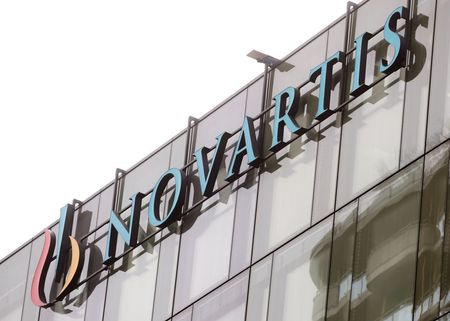By John Miller and Michael Erman
ZURICH/NEW YORK (Reuters) – Swiss drugmaker Novartis AG said on Monday it will test the malaria drug hydroxychloroquine in a randomized trial to see if the much talked about medicine is actually effective against COVID-19, the illness caused by the novel coronavirus.
The company hopes to have data on its efficacy by June, a lead researcher for the trial told Reuters.
The decades-old generic medicine has been touted by U.S. President Donald Trump and others as a “game changer” treatment for the highly contagious respiratory illness, and the U.S. Food and Drug Administration authorized it use in COVID-19 on an emergency basis. But there is not yet scientific proof that it works.
There are currently no approved medicines or vaccines specifically for COVID-19.
“Right now, we’re in a sea of anecdotes, and a lot of non-professional, poorly-informed people are making recommendations that are swaying how the public and patients view this (drug),” Dr. Richard Chaisson, the Johns Hopkins University professor leading the trial, said in an interview.
Novartis said it got the go-ahead from the FDA for the trial and it hopes to start recruiting 440 patients within weeks at more than a dozen U.S. sites. Results will be reported as soon as possible, the company added.
Use of the drug, which is also approved to treat lupus and rheumatoid arthritis, has soared since Trump started promoting it. But critics have expressed concern that the administration’s advocacy for an unproven medicine has short-circuited the FDA’s oversight process.
“We recognize the importance of answering the scientific question of whether hydroxychloroquine will be beneficial for patients with COVID-19 disease,” said John Tsai, Novartis’s top drug developer. “We mobilized quickly to address this question in a randomized, double-blind, placebo-controlled study.”
Companies such as Novartis, Roche and Gilead Sciences Inc are testing older medicines developed to treat other diseases for signs they could be repurposed to tackle the coronavirus epidemic.
Gilead just expanded a trial of its antiviral drug remdesivir, which previously failed as a treatment for Ebola.
Still, some fear the championing of hydroxychloroquine for COVID-19 has overshadowed potentially dangerous side effects like vision loss and heart problems. Novartis Chief Executive Vas Narasimhan has also said the medicine is one of his biggest hopes against the pandemic.
Chaisson said many of the clinical trials to research the drug are “either small or uncontrolled or overly ambitious.” He said the Novartis trial is designed to test the drug’s effectiveness quickly, and could yield results in June.
There are several additional studies of hydroxychloroquine underway, including at the University of Washington and University of Minnesota, as well as work by the National Institutes of Health in the United States.
Novartis’ Sandoz generics unit has pledged to donate 130 million doses of the medicine. Sanofi <SASY.PA> has also said it will donate 100 million doses of hydroxychloroquine to 50 countries.
(Reporting by John Miller, editing by John Revill and Bill Berkrot)


